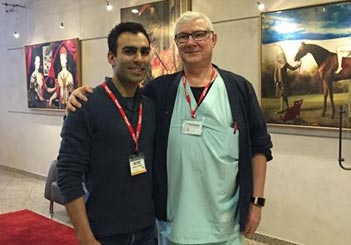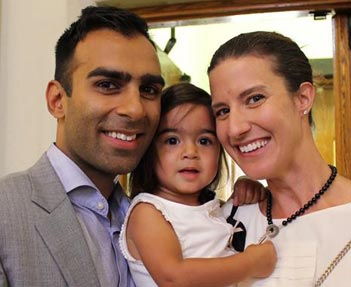Usmaan Hameed wins Zane Cohen Award
Usmaan Hameed is the recent winner of the Zane
Cohen award, which celebrates the clinical fellow in the
Department of Surgery who has made the most significant
achievement in any of the domains of medicine. Usmaan
is currently in the inaugural class of the new Translational
Research Program at IMS. His focus of study toward
earning an MHSc degree will be intraoperative imageguided
navigation for rectal cancer resection. The new
Translational Research Program is intended to bridge the
‘valley of death’ between early research discoveries and their
integration discovery and integration into clinical practice.
Usmaan has been interested in minimally invasive
surgery throughout his general surgery residency.
“Laparoscopic and open operations lack depth perception
in critical areas. For instance, during an abdominoperineal
resection (APR) for rectal cancer, it is often
difficult to assess the planes between the prostate and the
rectum, or the autonomic nerves during the dissection.
Operative navigation could be used to compensate for
this deficiency.” Usmaan will look at animal models during
his Master’s program with Dr. Victor Yang, a neurosurgeon-
engineer with an interest in image-guidance. He
will be working in combination with the Sunnybrook
Research Institute on the accuracy of intraoperative navigation
for guiding rectal cancer resection.
Q: Why were you selected for the Zane Cohen award?
A: “I was heading for a fellowship in minimally invasive
surgery but felt I received a lot of exposure to MIS during
residency. I wanted to expand the use of minimally invasive
and transanal techniques in advanced GI malignancy and
became interested the surgical oncology fellowship directed
by Frances Wright. The fellowship is a two-year Royal
College accredited program. In first year the 3-month
core rotations of the program, focused on colorectal,
hepatobiliary, breast, melanoma and sarcoma treatment,
is intended to provide a multidisciplinary understanding
of cancer biology. The second year electives are chosen to
focus in an area of interest for the fellows. Our faculty are
particularly good at minimally invasive techniques in the
G.I. area. Shady Ashamalla, Fayez Quereshy, and Peter
Stotland were excellent mentors for me.

Usmaan with Prof. Joel Leroy at IRCAD, France.
In addition to my core rotations, I spent eight weeks
with Prof. Joel Leroy at IRCAD in Strasbourg, France,
a world leader in novel laparoscopic, transanal and
endoscopic approaches. My clinical goal at IRCAD was
to gain expertise in Transanal Minimally Invasive Total
Mesorectal Excision (TAMIS-TME). This technique is
particularly valuable in low rectal cancers to improve the
exposure of dissection in a deep, narrow pelvis. TAMISTME
is giving birth to a new era in sphincter preserving
trans-anal surgery.
From an academic perspective, IRCAD also has experience
with intraoperative surgical navigation in hepatobiliary
surgery. While I was there we looked at a novel
use of narrow-band imaging, which uses light of specific
wavelengths other than the traditional white-light used
in laparoscopy, to evaluate for bile leak intra-operatively.
Similar techniques may be used in rectal cancer to better
assess tumour regression following radiation.
“Patients with rectal cancer are often treated with neoadjuvant
chemoradiation prior to surgery, and evidence
has emerged that this treatment gives a complete clinical
response in 20-30% of cases. A complete clinical response
isn’t a pathological complete response. If we excise the
radiation scar, up to 25% of these patients will still have
viable tumor cells. Identifying better predictors of a sustained
complete response in patients will allow us to more
effectively determine which patients can safely avoid surgery.
There are now trials randomizing patients to surgery
versus watchful waiting after neoadjuvant treatment.
“The courses in the translational research program
are flexible and unique –modules ranging from qualitative
methods and clinical epidemiology to marketing,
entrepreneurship and applied intellectual property. The
program also encourages collaboration across disciplines
such as engineering to help build device prototypes. This
is a unique program that will hopefully foster a nurturing
environment for surgical innovation in Toronto.”
|
Q: What about research ethics oversight?
A: “Ethics is of utmost importance in the area of innovation.
Traditionally, after Health Canada approval,
clinicians often use new devices in the clinical setting
on patients outside a prospective study. Have these
devices been appropriately tested and in what setting?
Do patients know when we trial a new device for the
first time in the OR? These are very relevant topics that
we are looking to investigate with Karen Devon who is a
surgeon and ethicist on faculty.”
Q: Are there animal models that are helpful?
A: “The model depends on the area investigated. Pig
models are relatively close in anatomy to the human pelvis
but are extremely expensive. Cadaveric models are helpful
models for operative navigation. We can use mousetumour
models to look at novel uses of contrast imaging.
The translational program has a variety of participants
and mentors – engineers, basic scientists, and clinicians
– which allows us to tackle the same problem using different
perspectives. The program directors include Joseph
Ferenbok - an information scientist, and Stuart Berger -
an immunologist” (http://trp.utoronto.ca/).
Q: Of the 200 or more fellows, how did you earn the Zane
Cohen award?
A: “Zane Cohen enabled this generous award. It’s an
honor to receive it, as there are many who deserve to be
recognized. It is a very productive cohort of fellows and
I was humbled to receive the award. In our fellowship
there are 4 to 5 surgical oncology fellows per year, a total
of 10 in the program. As co-chief fellow I helped organize
the surgical oncology lecture curriculum and journal
clubs, fellowship interviews and selection, and other
administrative duties such as visiting professor lectures.
This was in addition to teaching, research and clinical
performance that contributed to the award.”
Q: Teaching seems to be a prominent part of your academic
life based on the awards you received in residency.
A: “I really enjoy teaching residents and medical students.
My parents were both educators so perhaps that
is where my interest comes from. My mother was an elementary
school teacher and principal who emigrated and
helped bring her family to Canada as refugees during the
Idi Amin crisis in Uganda. My father was a professor and
scientist from Pakistan who later taught anatomy, microbiology
and parasitology at the University of Alberta in
Edmonton. Both were immigrants to Canada. As a result
I’ve been interested in education and in international
health and international travel.

Usmaan Hameed with his wife Daniela and their daughter Mia Grace
I have a very supportive wife, Daniela, whom I
met during medical school at the University of British
Columbia. She is a staff obstetrician-gynecologist at
Humber River Hospital. We married in residency and
have a two-year-old daughter, Mia Grace. In the past
we have worked on global health projects in Zimbabwe,
South Africa, Brazil and Tanzania. We hope to continue
travelling with Mia to expose her to different cultures
and to preserve the heritage of our families as we raise
our daughter. I play ice hockey as a goalie a few times
per month as well as on the General Surgery team in the
Department of Surgery games Dr. Rutka facilitates. I’m
not that big, so I try to use my cat-like reflexes instead
of bulk to defend the goal.”
Q: What are you reading currently?
A: “All fellowship material for my Royal College
exam right now, but I especially enjoyed reading Atul
Gawande’s books Complications, and Better during residency,
and most recently Being Mortal.”
M.M.
|